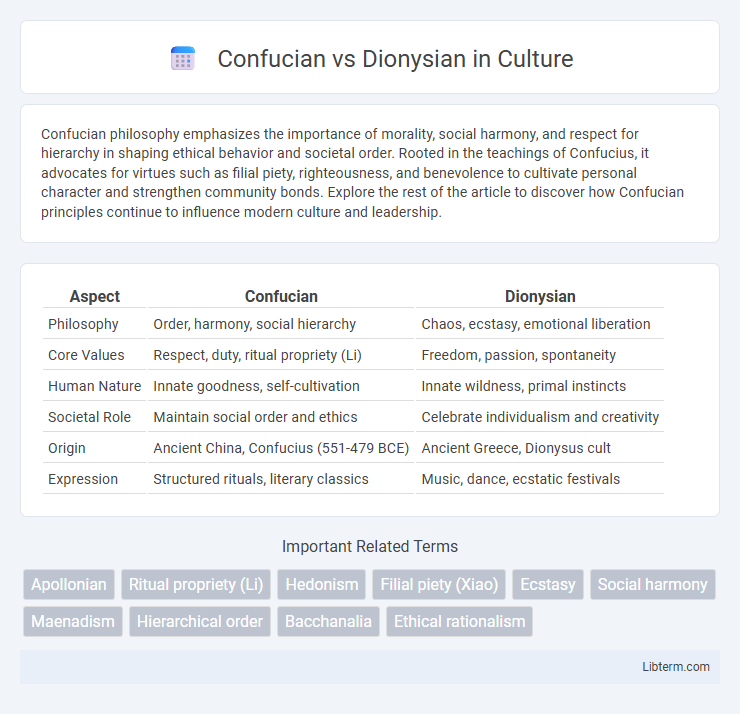Confucian philosophy emphasizes the importance of morality, social harmony, and respect for hierarchy in shaping ethical behavior and societal order. Rooted in the teachings of Confucius, it advocates for virtues such as filial piety, righteousness, and benevolence to cultivate personal character and strengthen community bonds. Explore the rest of the article to discover how Confucian principles continue to influence modern culture and leadership.
Table of Comparison
| Aspect | Confucian | Dionysian |
|---|---|---|
| Philosophy | Order, harmony, social hierarchy | Chaos, ecstasy, emotional liberation |
| Core Values | Respect, duty, ritual propriety (Li) | Freedom, passion, spontaneity |
| Human Nature | Innate goodness, self-cultivation | Innate wildness, primal instincts |
| Societal Role | Maintain social order and ethics | Celebrate individualism and creativity |
| Origin | Ancient China, Confucius (551-479 BCE) | Ancient Greece, Dionysus cult |
| Expression | Structured rituals, literary classics | Music, dance, ecstatic festivals |
Introduction to Confucian and Dionysian Philosophies
Confucian philosophy centers on harmony, order, and moral cultivation, emphasizing virtues such as filial piety, righteousness, and social responsibility to create a balanced society. Dionysian philosophy, rooted in ancient Greek mythology and tragedy, values chaos, ecstasy, and the irrational, celebrating emotional depth and the primal aspects of human nature. These contrasting worldviews represent the tension between structured ethical principles and the embrace of instinctive vitality in shaping human experience.
Historical Origins and Cultural Contexts
Confucianism originated in ancient China during the 6th century BCE, emphasizing social harmony, moral order, and ritual propriety rooted in the teachings of Confucius. The Dionysian concept stems from ancient Greek culture, particularly linked to the god Dionysus, symbolizing chaos, ecstasy, and the breakdown of conventional norms through ecstatic rituals and theatrical expressions. These contrasting ideologies reflect the differing historical and cultural contexts: Confucianism as a structured ethical system supporting imperial governance, and Dionysian ethos celebrating emotional freedom and the subversion of societal constraints.
Core Principles of Confucian Thought
Confucian thought centers on the principles of filial piety, humaneness (ren), and ritual propriety (li), emphasizing social harmony and moral cultivation through respect for hierarchy and tradition. It advocates for self-discipline, ethical behavior, and the importance of education in achieving a well-ordered society. These core values contrast with the Dionysian focus on chaos, emotion, and instinct, highlighting Confucianism's foundation in order and rationality.
Essential Tenets of the Dionysian Perspective
The Dionysian perspective emphasizes chaos, emotion, and the primal aspects of human nature as essential tenets, celebrating instinct, creativity, and the dissolution of boundaries. It values spontaneity and ecstasy, embracing the irrational and the subconscious as sources of truth and meaning. This contrasts sharply with Confucian ideals, which prioritize order, rationality, and social harmony.
Rational Order vs. Emotional Expression
Confucian thought emphasizes rational order by advocating for social harmony, discipline, and structured moral conduct based on hierarchical relationships and ethical principles. Dionysian philosophy celebrates emotional expression through unrestrained passion, chaos, and the dissolution of boundaries, highlighting instinctive creativity and the primal aspects of human nature. The Confucian framework seeks balance through reason and societal rules, whereas the Dionysian approach values the liberation of emotions and the transformative power of ecstasy.
Social Harmony and Hierarchy in Confucianism
Confucianism emphasizes social harmony through the maintenance of hierarchical relationships based on roles such as ruler-subject, parent-child, and elder-younger, which create a structured and stable society. Rituals (li) and moral virtues like filial piety (xiao) reinforce obedience and respect within these hierarchies, ensuring communal order and cooperation. This contrasts with the Dionysian principle of chaos and individual expression, where social norms and hierarchies often dissolve in favor of emotional release and spontaneity.
Ecstasy, Chaos, and Creativity in Dionysian Ideals
Dionysian ideals epitomize ecstasy, chaos, and unrestrained creativity, emphasizing the dissolution of boundaries and the embrace of primal instincts. This contrasts with Confucian values, which prioritize order, harmony, and rational structure in social and personal conduct. The Dionysian pursuit of creative chaos fosters a transformative experience that breaks conventional restraints, fueling artistic innovation and emotional liberation.
Influence on Art, Literature, and Society
Confucian ideals emphasize harmony, order, and moral discipline, deeply shaping East Asian art and literature with themes of social hierarchy, ritual propriety, and introspection. In contrast, the Dionysian spirit, rooted in chaos, emotion, and ecstasy, drives Western artistic expressions toward passion, individualism, and transcendence, often depicting the unconscious and primal aspects of human nature. These opposing forces influence cultural narratives, where Confucianism fosters collective values and ethical reflection, while Dionysian elements inspire creativity through disruption and emotional freedom.
Modern Interpretations and Applications
Modern interpretations of Confucian thought emphasize social harmony, ethical governance, and the cultivation of moral virtues, influencing contemporary leadership models and community-building practices. Dionysian concepts are applied to modern art, psychology, and cultural studies as symbols of creativity, emotional freedom, and the embrace of chaos and irrationality. The dialogue between Confucian order and Dionysian spontaneity informs current debates on balance in personal identity and societal development.
Conclusion: Bridging the Confucian and Dionysian Divide
Bridging the Confucian and Dionysian divide involves harmonizing Confucian values of order, discipline, and social harmony with Dionysian emphasis on chaos, passion, and creative freedom. Integrating these philosophies fosters a balanced approach to life that embraces structure while encouraging emotional expression and spontaneity. This synthesis promotes holistic well-being by valuing both rational self-cultivation and the transformative power of ecstatic experience.
Confucian Infographic

 libterm.com
libterm.com